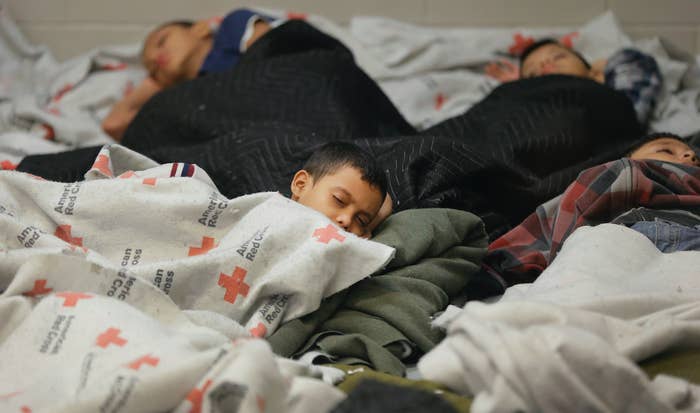
WASHINGTON — The federal government must provide immigrant children in US custody with adequate sleeping conditions, showers, soap, towels, toothbrushes, toothpaste, and dry clothes, a federal appeals court ruled Thursday.
The US Court of Appeals for the 9th Circuit rejected the government’s argument that it wasn’t required to provide certain basic hygiene products and sleeping accommodations for detained immigrant children under a 1997 settlement agreement that mandated “safe and sanitary” conditions. In June, a video of Justice Department lawyer Sarah Fabian went viral as she argued that the government was possibly not required to provide things like beds, toothbrushes, and soap.
The Justice Department’s “cramped” interpretation of the language in the 1997 agreement “is untenable,” 9th Circuit Judge Marsha Berzon wrote in the 3–0 decision.
“Assuring that children eat enough edible food, drink clean water, are housed in hygienic facilities with sanitary bathrooms, have soap and toothpaste, and are not sleep deprived are without doubt essential to the children’s safety,” Berzon wrote.
Since 1997, the government has been bound by a settlement reached in a class action known as the Flores case. The agreement states that immigrant minors held by US Customs and Border Protection must be held in “safe and sanitary” conditions, and that those conditions should be consistent with the government’s concern “for the particular vulnerability of minors.” It specifically says the government has to provide access to toilets and sinks, drinking water and food, emergency medical attention, and adequate temperature control and air ventilation.
In Thursday’s decision, Berzon wrote that limiting the government’s obligations to only the specific items listed in the text of the agreement would render the two key phrases at issue — “safe and sanitary” and “particular vulnerability of minors” — “wholly superfluous.”
The fight over conditions at Border Patrol stations predates the Trump administration, although detainees and government inspectors have continued to report unsanitary conditions and lack of food and other basic amenities. US District Judge Dolly Gee, who sits in Los Angeles, ruled in 2015 that the Department of Homeland Security had breached the Flores settlement, citing “voluminous evidence” of “egregious” conditions. In 2016, lawyers for the class of children involved went back to the judge, arguing the government continued to hold children in unacceptable conditions.
In a June 2017 order, Gee agreed that the government was again noncompliant. She highlighted evidence about children not being given enough to eat — there was one report of a detainee being given a cookie for breakfast and a cookie for dinner — the lack of access to soap and other hygiene products; unreasonably cold temperatures; and the lack of beds, pillows, or blankets. Parents and children reported trying to sleep on concrete floors and benches with only pieces of foil to cover themselves, and being held in crowded facilities where there wasn’t enough room for everyone to lie down at the same time.
The Justice Department took the case to the 9th Circuit, arguing that Gee had added new conditions to the 1997 settlement, and that if the plaintiffs wanted a court order specifically requiring the government to provide things like soap and a certain level of sleeping accommodations, they had to bring a new lawsuit.
The 9th Circuit heard arguments in June. The court offers a live video stream of hearings, and the recording of Fabian, the Justice Department lawyer, defending the government’s opposition to Gee’s order went viral. Fabian, a career Justice Department lawyer, reportedly received death threats, and NBC News reported that she put up a post on a private Facebook page defending herself.
“I think that many many people believe I was in court Tuesday arguing against providing certain hygiene items to kids,” Fabian wrote, according to NBC. She added later: “I do not believe that’s the position I was representing.”
The 9th Circuit dismissed the Justice Department’s appeal of Gee’s order, finding the judge hadn’t modified the terms of the1997 agreement.
The government could petition the full 9th Circuit to reconsider the three-judge panel’s decision, or it could petition the US Supreme Court to step in. A Justice Department spokesperson declined to comment.

